Why to consider running a home care business?
Home care can be a very rewarding business. The need for home care is rapidly growing and the demand is expected to more than double over the next 20 years. As an indication of that, here's a graph from AARP showing the projected number of Americans over the age of 80 which is a good indicator of expected market size.
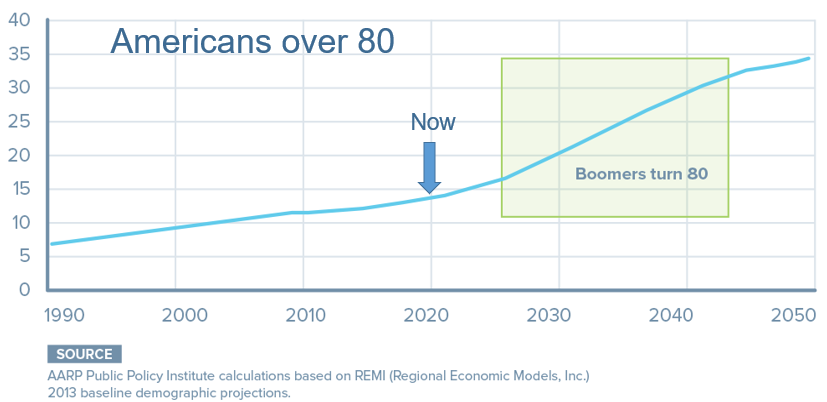
Even more importantly, home care is a rewarding profession where you can "do well by doing good."
We asked for reasons why people started their home care business and here's what we heard:
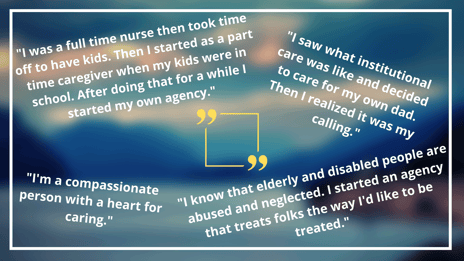
In addition to the individual stories above, there are also big businesses entering and expanding in the home care industry because of its growth rates and their perceived ability to achieve efficiencies and economies of scale. But owners and agencies who know their communities and can recruit great caregivers are positioned to thrive.
How much does it cost to start a non-medical home care agency?
Entrepreneurs should have a budget of $40,000 to $80,000 in order to start a non-medical home care agency. For other types of home care (like certified home health, read more here)
Why shouldn't I start a home care business?
Home care is not an easy business and things will go wrong. Here's what you're taking on:
- You need to qualify and apply (in most states) for a license (more below)
- Caregivers will miss shifts and even quit without notice.
- There's lots of paperwork to contend with including contracts, policies and procedures, assessments, employment documents and more. You have to be organized and could be audited.
- It's a 24x7 businesses and when starting out you, as the owner, might be the only fill-in caregiver on your roster. You need to determine if you're ready for that.
What is Home Care?

Home Care refers to personal care and companion services, delivered in the home of care recipients that enables care recipients (usually elderly or disabled) to stay in their homes. This kind of care assists recipients with Activities of Daily Living (ADLs) like eating, hygiene, bathing, toileting, companionship and other basic supports. There are different names for this type of care, as follows:
This is what we define as home care:
- Nonmedical Home Care
- Private Duty Home Care
- Companion
Care
- Homemaker
- Home Health Aides
- Caregiving Services
- Consumer Directed Services
There are other "near neighbor" types of services, often grouped into the Home Health Care Industry (SIC Code 8082 and NAICS code 62161) that are NOT addressed here.
These "near neighbors" are NOT home care:
- Home Health Care (Nursing)
- Durable Medical Equipment
- Home Infusion
- Hospice Care (for end-of-life)
- Assisted Living
- Nursing Homes
Here's a simple Infographic that explains Home Healthcare vs Non-medical Home Care Courtesy of Invoiceberry.com
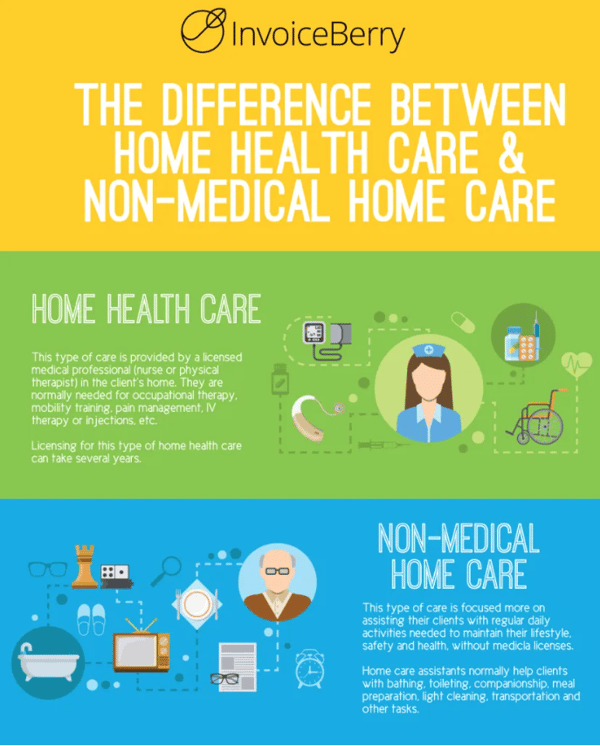
Home care business eligibility and regulatory compliance
One of the first things you need to check are the eligibility and regulatory requirements for running a home care business in your state. To start, go to Google and search for "<my state name> home care license application" and other similar searches.
CAUTION: Many of the search results you will see will be from franchises and consultants. Opening a franchise or working with a consultant can potentially be great (more on this below), but for this initial search look for results from your state government. The website should end with .gov.
Here's what you're looking for:
- Some states are "regulated" and others are not. For example in Alabama and Michigan, you can start right away
- In the regulated states, there will be a minimum set of criteria like you might need to be a nurse or have a 2 or 4 year college degree
- In regulated states there will be an application fee and in some states it can be expensive. For example in Texas it's around $2,000 and in California it's over $5,000.
- Some states have a waiting period of months or even years. Similarly, some states might not be issuing licenses.
- Other states will start by offering you a provisional license for example to start servicing your first two clients and then they will come and assess your agency to determine if you're ready to progress to a full license.
Make sure to do this first!
Here is a related video from a leading home care coach named "Coach Michele."
Finding out how to get started in each state is tricky. To help, we've created this state by state guide to connect you to the state web page, home care associations, and consultants who are experts in your state. Click here for the state-by-state guide or click on the banner below:

Getting your "Back Office" Ready
In addition to setting up your business (e.g., LLC or S-Corp), obtained necessary licensing, obtained your Tax-ID (EIN), and everything else your state requires, you need to have your back office ready to go. These should be covered in your operating policies and procedures manual (that needs to be compliant with your state rules). Here's a starting point list:
- Recruitment and hiring processes (and retention policies)
- Education including orientation, basic education and continuing education.
- Client intake processes and documents
- Scheduling processes including filling open shifts,
- Assessment and supervisory visit processes
- Customer Service Surveys (some states require that these be done by an unbiased 3rd party)
- Billing and Collection Processes
- Payroll processes
- Complaint tracking and management (don't delegate this - you should hear all the bad news and take it as an opportunity to improve)
- Evaluation process
- Disciplinary processes
- Budgeting
- and more
Here are some procedure manual offerings from a wonderful consultant named Ginny Kenyon, who runs Kenyon Home Care Consulting. You'll notice that they are specific to the business line and the state:

Home care software needed for your agency
Most home care agencies use three key pieces of software, explained below:
-
Home Care Agency Website: Your website does several things for you. First and foremost, it helps people find you when they are shopping for a home care service. Second, it gives you a chance to communicate your unique value proposition. Once people know about your agency, they will look through your website to learn why you are in the business and to think about whether they should choose you versus a competitor. Lastly, your website is a two-way communication tool. In addition to letting you share information about your agency, your site should allow potential clients to express interest in your agency and also allow caregivers to apply to be on your team.
-
Home Care Agency Management Software: This is the software that you use to manage your operations. It tracks your client demographic, plans of care, schedules, caregiver demographics, skills, and availability, and enables timekeeping (generally via a GPS enabled mobile app of via voice telephony where the caregivers dial in or via a mobile app) plus tracking of the completion of care plan items. Lastly, it creates your bills and payroll. Another feature offered by some of the software vendors is an app for family members to stay engaged in the care of their loved ones (so they can track schedules, see updates and communicate with you).
-
You can learn about Ankota's software offerings by clicking here
Here are some more details about home care Software:
Scheduling
Electronic Visit Verification (EVV):
-
Accounting Software: Accounting software tracks your "receivables" (keeps track of when your bills are paid), and your expenses. Plus some accounting software also cuts the checks to pay your caregivers and other expenses. Most agencies use Quickbooks for their accounting software and although Quickbooks has payroll management, a lot of agencies use a different software system for their payroll.
Staffing for Success
Now that you're ready to start your business, you need a staff. Here's the recipe for success:
- Marketer: In the most successful start-ups this is the owner. You are the brand and the credibility. You've got your experience, story and passion for home care.
- Intake person: You'll be all around town promoting your business and telling your story, and the hope is for the phone to ring. The person answering the phone needs to be attentive with great listening skills and they also need to be respectful and enthusiastic.
- A Nurse: Many states require you to have a nurse on staff but even if they don't require it, it's a good idea. Note that at first the nurse can be part time. Reach out to your network and see if you can find a part time nurse to start.
Important note: Your caregivers are your business. You need to recruit well and treat your caregivers well.
Obtaining clients for your business
Without caregivers you don't have a product to sell, but without clients you don't have a business. The best home care start-up entrepreneurs have a heart for care, a great personal story and the ability to sell.
.png?width=248&name=people%20and%20technology%20at%20its%20best%20G%20(5).png)
Some best practices for getting started are as follows:
- Shop your competition: Google "home care" and the name of your town and see what comes up. Try variations like elderly care, in home care, and others including home health care (because even though you won't be providing medical care your prospective clients will Google it), Borrow your cousin's phone and call them all, make notes about their professionalism. Ask them what they specialize in. When they tell you a specialty (like Dementia) ask how their caregivers are trained for that (hint: if it's 1 hour they don't specialize in dementia)
- Decide Your Flavor: Most home care agencies are "vanilla." They provide elderly care and help with activities of daily living and they likely say that they provide dementia care. How can you be different? Are you connected to a handyman who can do home modifications? Are you an expert in preventing falls, can you furnish a caregiver as a cruise companion? Can you provide day surgery transportation and in home care after the surgery? Fill the gaps that your competitors have left!
- You need a website: Your website needs to tell your story, let customers know your "flavor" and look modern and professional. There are plenty of very expensive options available but my recommendation is to focus your energy on your story and differentiation and allocate $400. We don't make home care websites at Ankota but we can help you. As an example, look at the Ankota Cares website. We built and hosted this site for $250.
- Hold a grand opening: Have your friendly intake coordinator, your nurse and your favorite recruited caregivers at the event. Also invite some friends who can help greet guests and tell them how wonderful you are. Invite community leaders. But most importantly you want to invite people who can refer clients. This includes the assisted living centers in your area, the discharge staff at skilled nursing facilities, and leaders in your aging community. Your goal is to make a strong entrance and to set up a meeting with each of the potential referral sources.
- Use your network: The first clients are the hardest. Reach out to your friends, neighbors, church members, clubs and any community that you're connected to. This is a great way to find your first clients and success stories.
- Marketing: You have a website, you've done a grand opening, but now you need to figure out where to advertise. Plus it's tough in our mostly paperless world, but think of places where wealthy elderly people might go. How about live theater bulletins?
- Power Partners: One of the home care marketing and sales gurus who we really love is Steve the Hurricane and his model is based on finding the "power partners" in your community like the assisted livings, geriatric care managers, continuing care retirement communities, skilled nursing discharge teams and more. Pro tip: when you visit an assisted living facility, ask for a tour. Get a feel for the residents and facilities and do more listening than selling. Find out what they need is more effective than telling them what you have.
- Discipline: Make a plan to be in the community 3 days a week and to make 25 contacts a week. Lock it in your schedule and stick to it (and if you're the owner, which is usually the best, make sure that you have an office manager who can do firefighting without your immediate help!)
Sources of Home Care Income
The home care industry has many sources of income (payers). Depending on your geography (demographics and wealth), you need to target the payer sources that fit.
Here's a chart of percentage of revenue by payer source from Home Care Pulse (note that this survey mostly represents home care agencies in affluent communities):
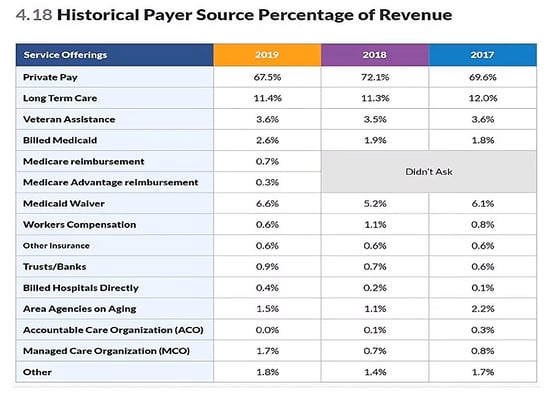
Here are some of the key payers:
- Private individuals: Wealthy individuals in affluent communities are able to pay for care from personal wealth.
- Medicaid: Medicaid waiver programs are one of the largest payers of home care. Note that some state Medicaid programs have been outsourced to insurance companies called MCOs (Managed Care Organizations) that are listed in the table above. Medicaid has a lot of complexity (here's a short video).
- Veterans Administration: The VA pays for home care for veterans and this might be under-served by your competitors.
- Long-Term Care Insurance: LTCI pays for home care. If you can bill Medicaid you can handle the LTCI filing requirements but in general it's critical to document that the client is receiving help with multiple activities of daily living.
- County Programs: Some counties have home care funds.
- Medicare Advantage: For the most part Medicare does NOT pay for non-medical home care services, however this is beginning to change (see the first time entry in the table above).
Getting Help: Consultants, Franchises and DIY
Earlier in this guide we encouraged you to Google the requirements to open a home care agency in your state and we suggested that you look for an official government answer. If you did this you likely found that the first results and paid advertisements were from home care franchises and home care consultants. Purchasing a franchise or working with a consultant can be exactly the right move for your agency and it can accelerate your time to market. DIY (do it yourself) is harder for sure. Below are some things to consider to decide whether a franchise or a consultant is right for you.
-jpg.jpeg?width=250&name=CTAS%20(9)-jpg.jpeg)
Home Care Franchises:
Opening a franchise will get you started quickly and equip you with a brand, advertising, procedures, training and tools that you need to get a quick start. Here's a link to an article on the best-liked home care franchises. Some of the benefits and concerns of going the franchise route are as follows:
- Quick start with a brand, a website, tools and training
- Start-up fee ranging from $20,000 to over $100,000
- Long term commitment (usually 7-10 years)
- Ongoing royalty and service fees
Home Care Consultants:
There are many great home care consultants who have "been there and done that." They've been through it before and can accelerate your start-up with their training and products (Operating Policy and Procedures manuals, that are state specific, forms and solid caregiver recruiting strategies).
Some cautions regarding consultants are as follows:
- Make sure that the consultant is an expert in your state
- Evaluate their content and style before you start. Most consultants share a lot of advice on their blog or through videos. Ask yourself how their published advice makes you feel and go with a consultant who feels good.
- There's a wide range of costs and in some cases more expensive doesn't necessarily mean better.
Home Care DIY:
If you elect to do it yourself, it will likely take longer and you'll make mistakes along the way. This guide has been designed with the intention of giving you a realistic picture of the work needed to start a home care agency. If this industry is brand new to you, getting help is strongly recommended.
Resources we trust and recommend
Here are some industry players we trust and recommend. One reason is that they all share ample information to help you on your journey.
- Home Care Pulse: Provides a home care industry benchmark study, customer satisfaction tracking services for agencies, and caregiver education.
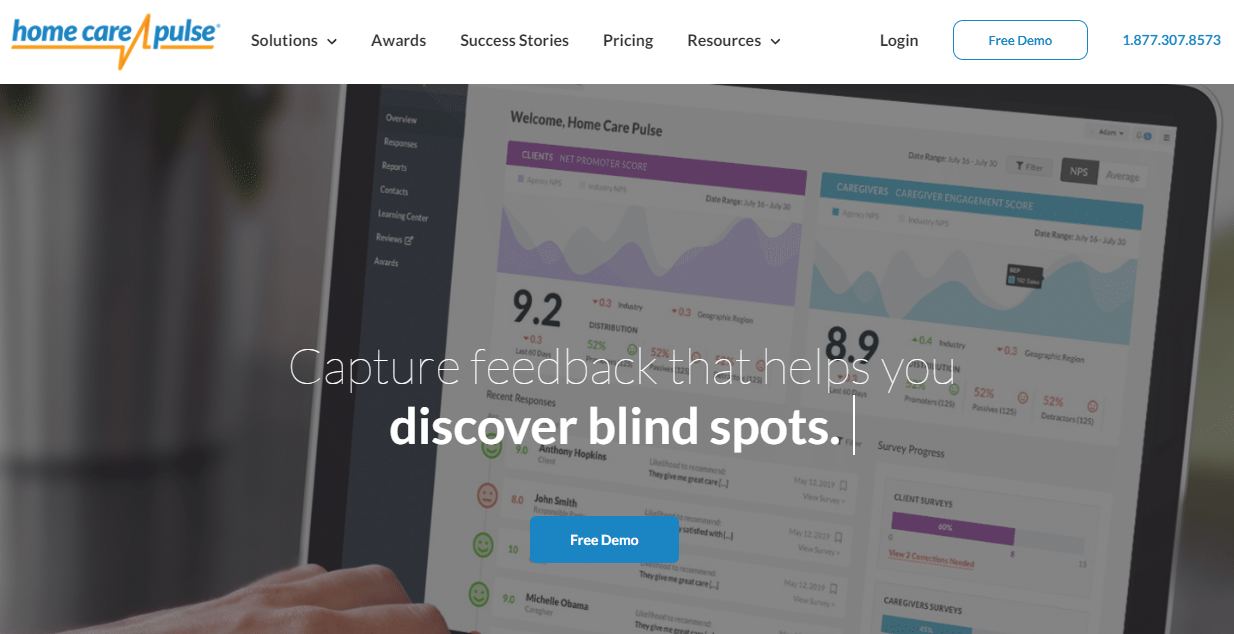
- Steve "the Hurricane" Weiss: Steve started his career as a home care marketer for an agency with 16 clients and he grew them to over $5M in revenue per year. Now he provides marketing bootcamps and consulting services designed to help agencies "blow away the competition." To get a glimpse of Steve, here's a recent webinar where we featured Steve.
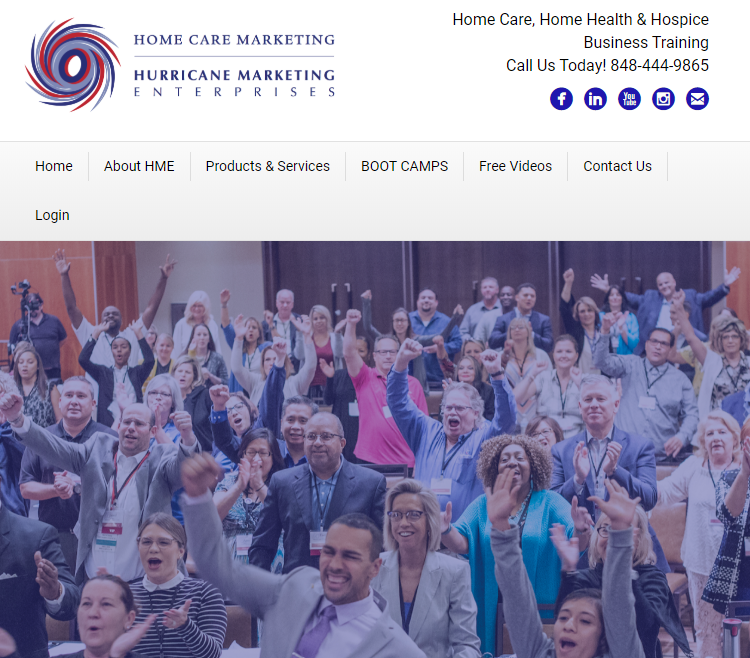
- Kenyon Home Care Consulting: Ginny Kenyon provides a wide range of home care consulting services including policy manuals, interim management and help launching agencies. We send a lot of inquiries her way and she's always willing to help point agencies in the right direction.
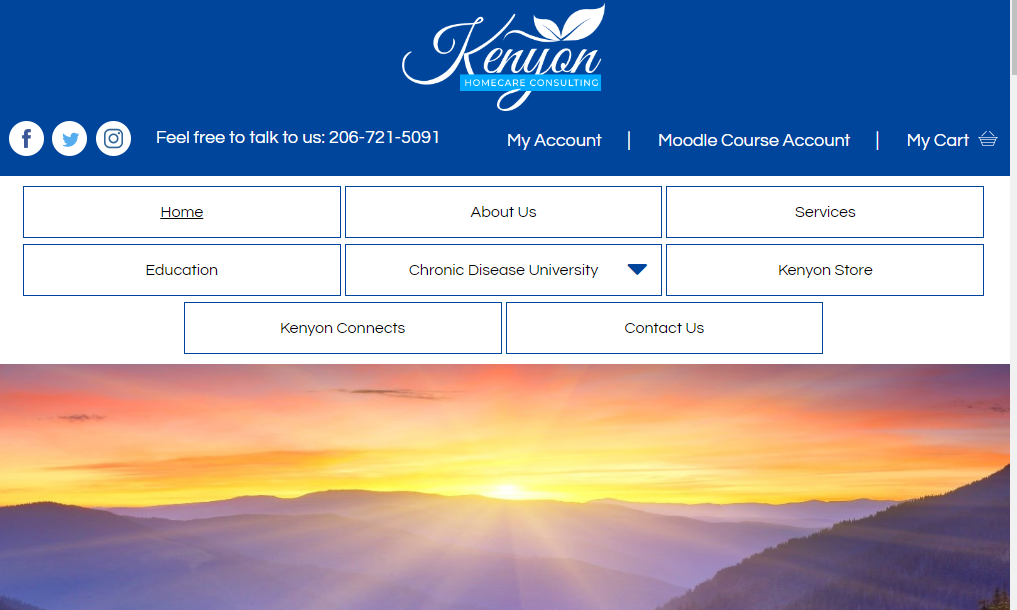
- Coach Michele: Of the people listed in this section, Coach Michele is that only one I haven't met, but I feel like I have. She has one of the best YouTube channels in the home care industry and gives a lot of great advice. Plus her services are at an affordable price.

- Home Care Tech Report: Tim Rowan publishes a newsletter called "Home Care Technology Report" that keeps you apprised not only on technology but also on policy. He never just talks about tech but instead he shares stories from agencies and how they're benefiting from tech.
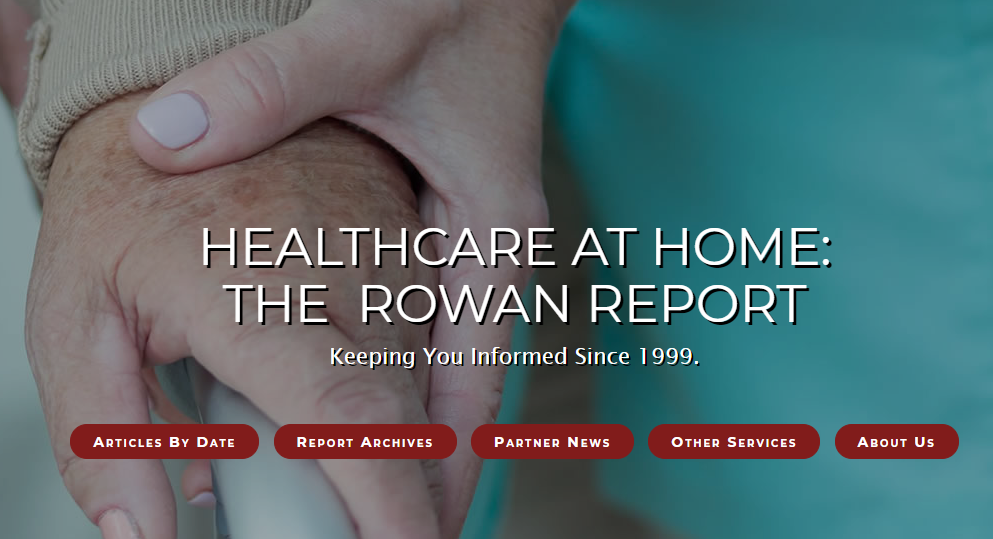
- Paragon Payment Solutions is a partner we trust. Our partner in payment processing and credit card solutions comes for free with your Ankota system! For more information click here.
- Carelistings.com: We strongly align and support their mission of bringing together families, caregivers, and senior care providers in one place to eliminate the care shortages in senior living.
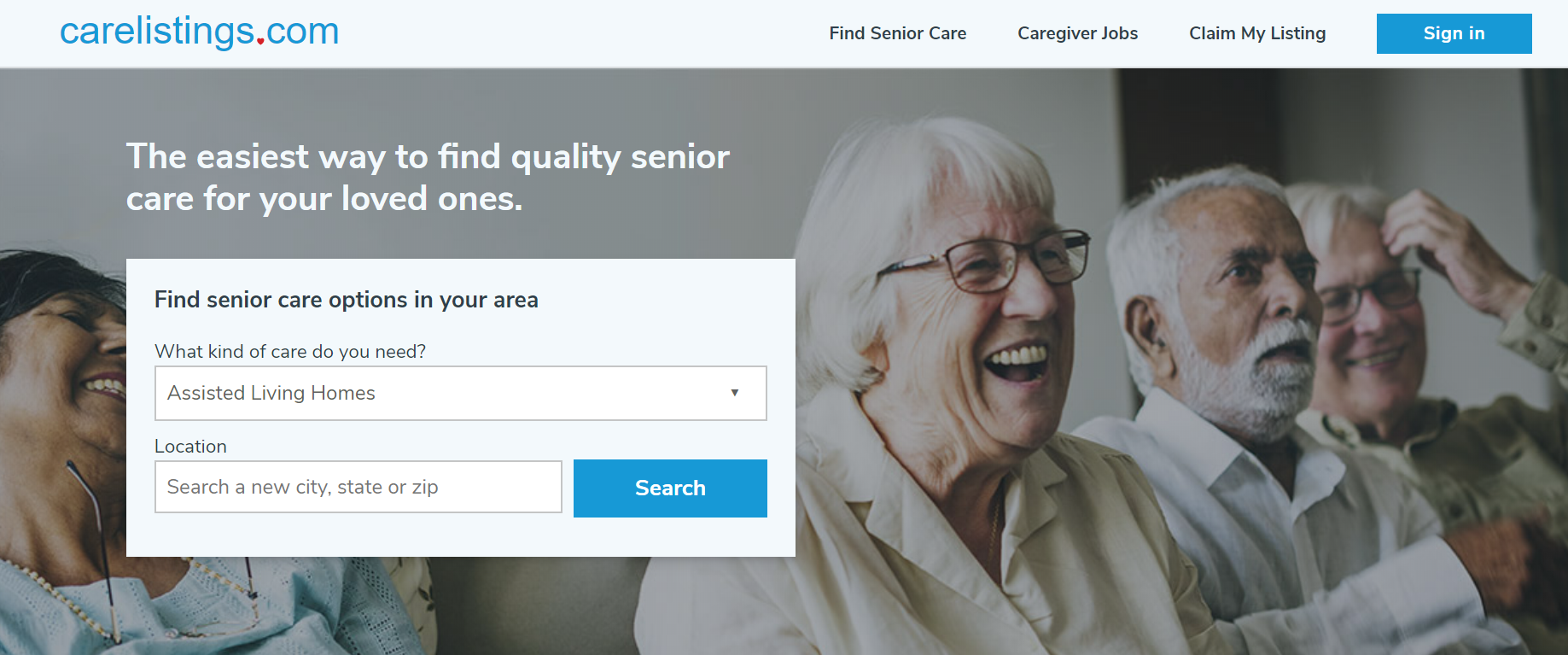
As a bonus, we've also created a home care community site for sharing resources and facilitating conversation. Thanks for being the heroes who care for the elderly and disabled living at home.
Check out the Ultimate Guide Video Edition on Youtube
Related articles from our blog:





-jpg.jpeg?width=250&name=CTAS%20(9)-jpg.jpeg)




